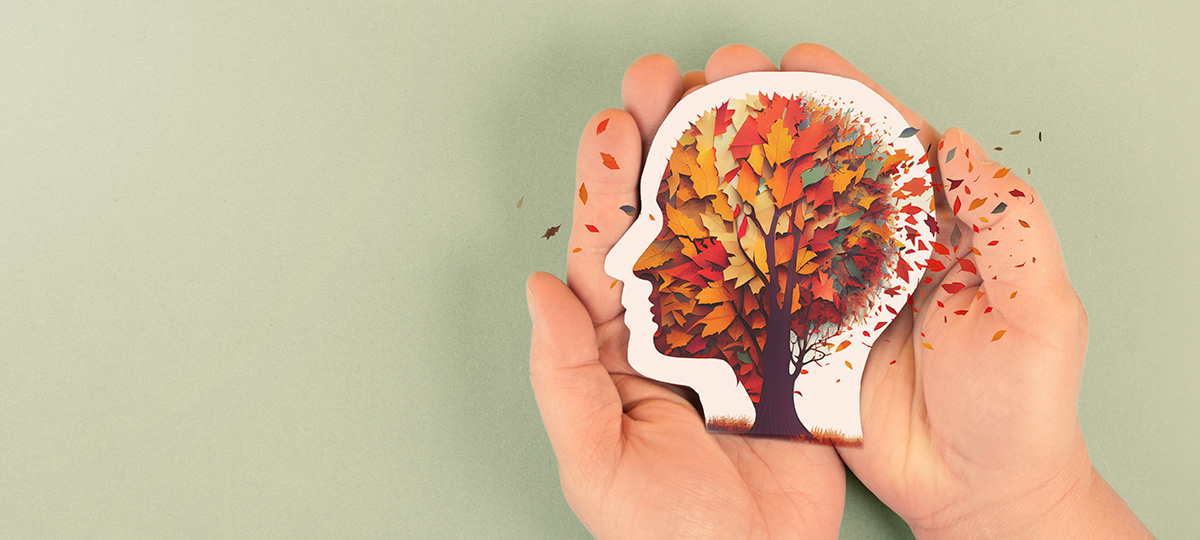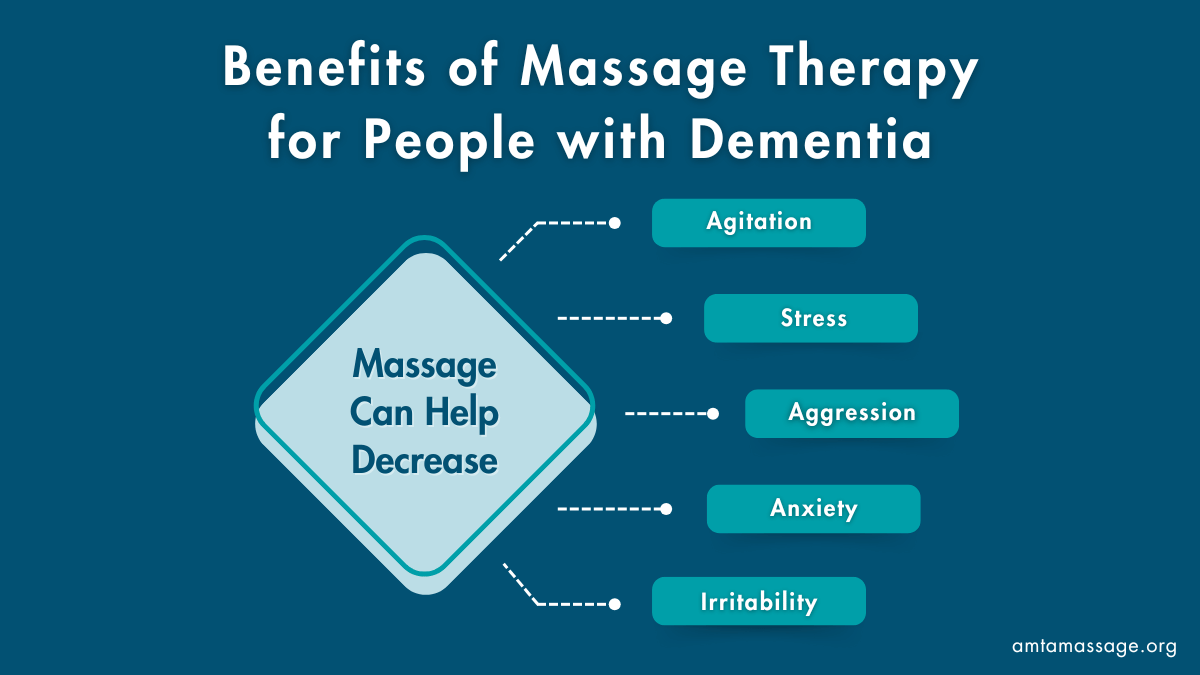Massage Therapy Journal
A Touch of Compassion
Learn what you can expect when working with clients with Alzheimer’s disease.
Someone is diagnosed with dementia every 3.2 seconds. Massage therapy may help ease the symptoms of the disease.
by David Malone, November 1, 2024

In 2020, over 55 million people were living with dementia worldwide, and, according to Alzheimer’s Disease International, this number is set to increase to 78 million people in 2030 and 139 million by 2050—roughly one new case of dementia every 3.2 seconds.
As with much of the growth that occurs in the massage therapy profession, research has proved invaluable in broadening our understanding of what massage can offer people with dementia.
Dementia is a blanket term that comprises several diseases that affect memory, thinking and the ability to perform daily tasks, according to the World Health Organization (WHO). Alzheimer’s is the most common type of dementia, accounting for anywhere between 60% and 80% of cases.
The WHO lists the following as some of the most common early signs and symptoms of dementia:
Massage therapy has shown promise in helping manage some of the signs and symptoms associated with dementia. “Massage therapy can improve feelings of security if the client enjoys the caring touch and responds with trust to the therapist,” says Katie Brewer, LMT. “They may not remember the therapist by name or face, but they will remember how the therapist made them feel.”
A 2020 review1 of sensory-based interventions for adults with dementia and Alzheimer’s disease included 47 articles from nine databases searched from 2002 to 2017. Some of the sensory-based interventions investigated—in addition to massage—were light gardening, music, Montessori, animal-assisted therapy, dance and yoga interventions. Massage therapy was the only intervention with strong evidence supporting its benefits.
“Some families of people with dementia will seek massage therapy for their loved ones for relaxation, whereas others come for relief from pain,” says Sheila Alexander, a massage educator and owner of Senior Spa.
Regardless of the specifics as to why they are seeking out massage, individuals with dementia and their families and caregivers can all benefit from massage therapy.
Feelings of anxiety, sadness or anger are common with dementia and the memory loss that comes with it. These feelings can cause dementia patients to feel agitated, which can sometimes lead to aggression.
Massage therapy has emerged as a non-pharmacological intervention to help manage agitation, stress and aggressive behavior in people living with dementia. “Massage therapy can calm anxiety by invoking the relaxation response if the client enjoys the touch,” Brewer says.
A 2020 literature review2 explored massage therapy as a non-pharmacological intervention to help control agitation and stress in patients with dementia. The review examined the role of massage therapy (alone or in conjunction with other non-pharmacological interventions such as aromatherapy or music) in easing aggression and related behavioral disorders in patients with dementia.
Researchers found that massage therapy (alone or in conjunction with other interventions) can significantly decrease agitation, aggression, stress and anxiety in patients with dementia. “The combination of massage with aromatherapy seems to impart the most significant results in patients with dementia,” researchers noted.

Additionally, a 2022 study3 assessed combinations of non-pharmacological interventions for the reduction of irritability in people with dementia. This crossover randomized controlled trial observed 60 patients with different types and stages of dementia with irritability.
The study included three non-pharmacological interventions: validation therapy, aromatherapy/massage and music therapy. The trial found that aromatherapy/massage was the most effective non-pharmacological intervention, followed by validation therapy and music therapy.
Brewer and Alexander suggest massage therapists exercise extra precaution to ensure massage itself does not increase anxiety and agitation in the client.
This may include:
“I do not ask the client to undress because consent is sticky with a person who has dementia,” explains Brewer. “I do not want them to become confused about why they are undressed, who I am and what I am doing to them.”
Alexander agrees that leaving patients dressed is important with this specific population. “For 16 years, I worked in a continuing care retirement community and performed most of the massage sessions in the clients’ rooms. I modified chair massage techniques for the residents in armchairs, wheelchairs and geri-chairs. All of these sessions were done through their clothing,” Alexander says. “Specific training in geriatric massage is necessary for this special population.”
For clients with dementia, massage provided by their caregivers may also be beneficial.
“I would like to see more awareness on the part of caregivers on the benefits of massage for those with dementia,” says Brewer. This isn’t an empty wish, either. There have been multiple studies suggesting the benefits of caregiver-administered massage.
A 2022 study4 explored the effects of manual massage given by family caregivers for patients with dementia that included 12 pairs of participants (dementia patients and caregivers). Before the interventions began, caregivers received a four-hour, full-body manual massage training course.
Caregivers then gave 30-minute massages to the dementia patients once a week for a 10-week period. Researchers administered the Cornell Scale for Depression in Dementia, Cohen-Mansfield Agitation Inventory, and Zarit Burden Scale assessments before and after each intervention.
Results showed total scores on all questionnaires significantly decreased after the intervention. Additionally, two subscale scores of the Cornell Scale for Depression in Dementia—behavioral disturbance and physical signs—reduced significantly. The study concluded that the preliminary evidence suggests that massage therapy provided by caregivers shows some significant benefits.
A 2023 study5 investigated the effectiveness of family caregiver-administered home-based massage in managing dementia symptoms, as well as reducing caregiver stress. The study comprised 38 pairs of participants (dementia patients and their family caregivers) who were randomly placed into either the experimental group or the control group.
Caregivers underwent three, one-hour massage trainings. Patients then received a 30 minute, home-based massage from their caregivers three times a week for eight consecutive weeks. Researchers assessed the Cornell Scale for Depression in Dementia (CSDD), Cohen-Mansfield Agitation Inventory (CMAI), and Perceived Stress Scale (PSS) before and after the interventions.
Post-intervention, the experimental group exhibited significant improvements in PSS, CSDD and CMAI scores compared to the control group. “Family caregiver-administered home-based massage therapy is recommended for managing dementia symptoms and reducing caregiver stress,” researchers noted.
“My father had Alzheimer’s and I cared for him the last seven months of his life. Once his child, I became his parent,” Alexander says. “This is what I learned from that experience: People with Alzheimer’s are completely in the moment. Unless there is agitation, they’re not worried about tomorrow or regretful of the past.”
______________________________
Share Your Feedback on Massage Therapy Journal
Take our quick survey to share your insights and help us enhance our publication!
A Touch of Compassion
Learn what you can expect when working with clients with Alzheimer’s disease.
Should You Specialize?
Choosing a specialization for your massage therapy practice comes with a host of benefits, but you need to find what is right for you.
1. Smith BC, D’Amico M. “Sensory-based interventions for adults with dementia and Alzheimer’s disease: A scoping review”. Occup Ther Health Care. 2020 Jul;34(3):171-201.
2. Zhao H, Gu W, Zhang M. “Massage therapy in nursing as nonpharmacological intervention to control agitation and stress in patients With dementia”. Altern Ther Health Med. 2020 Nov;26(6):29-33.
3. Dimitriou T, Papatriantafyllou J, Konsta A, Kazis D, Athanasiadis L, Ioannidis P, Koutsouraki E, Tegos T, Tsolaki M. “Assess of combinations of non-pharmacological interventions for the reduction of irritability in patients with dementia and their caregivers: A cross-over RCT”. Brain Sci. 2022 May 26;12(6):691.
4. Liu YC, Liao CN, Song CY. “Effects of manual massage given by family caregivers for patients with dementia: A preliminary investigation”. Geriatr Nurs. 2022 Jul-Aug; 46:112-117.
5. Liu YC, Lo YT, Peng HY, Song CY. “Effectiveness of a home-based, family caregiver-administered manual massage intervention in managing dementia symptoms and reducing caregiver stress: A randomized, controlled clinical trial”. Geriatr Nurs. 2023 Sep-Oct; 53:162-169